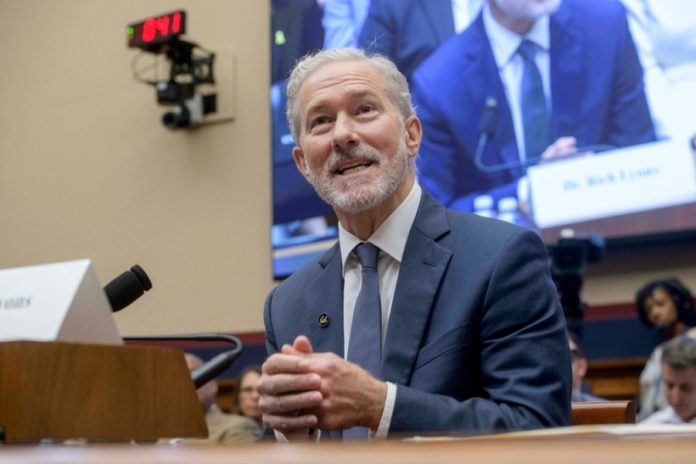
Last week, the chancellor of the University of California-Berkeley appeared before Congress and refused to commit to transparency about foreign funding. When I asked Chancellor Rich Lyons if Berkeley would disclose every dollar it receives from foreign governments, he dodged — repeatedly. “I’m not ready to make that commitment today,” he said.
Even more alarming, he admitted that hostile foreign actors regularly approach the university but claimed he was “not in a position” to name a single example. The American people deserve to know who is bankrolling our public universities. If Berkeley won’t come clean, it raises a serious question: What are universities hiding — and why?
This isn’t just an academic issue. It’s a direct threat to our national security.
In January, the University of Michigan cut ties with a Chinese university over concerns that its funding could be linked to Beijing’s military-industrial complex. On Tuesday, the Department of Education opened an investigation into the university to assess its compliance with federal law and the accuracy of its foreign funding disclosures.
While I welcome the University of Michigan’s decision to stop the flow of money from the Chinese Communist Party, serious questions remain. Why were tens of millions in foreign funding reported late — and in some cases, misclassified as coming from “nongovernmental entities” when the money appears to be directly tied to foreign governments? What are they hiding?
That’s why I reintroduced the Deterrent Act, legislation designed to bring long-overdue transparency to foreign influence in higher education. The bill does three things:
- It shines a Light on Foreign Funding — It lowers the foreign gift disclosure threshold from $250,000 to $50,000 and requires faculty and staff at research-heavy institutions to disclose foreign financial ties.
- It holds Institutions Accountable — It introduces fines and the potential suspension of federal assistance for failing to report foreign funding.
- Protects National Security — It treats gifts from hostile nations with greater scrutiny, recognizing that foreign money is often used to buy influence and suppress academic freedom.
I believe in the power of international education exchange. I have lived it.
As the son of a Washington State University forestry professor, I saw firsthand how cultural exchange can enrich learning. As a college student, I studied in France, Jordan, Syria and Kuwait, eager to understand different worldviews. I served with the Jesuits in Mozambique, teaching students and coaching basketball.
But there’s a big difference between genuine academic collaboration and foreign interference masquerading as philanthropy.
The passage of the Deterrent Act with bipartisan support is a significant and hard-won victory in the fight to protect academic integrity from foreign interference. This bill reflects a growing consensus that transparency and accountability are essential in safeguarding American universities from the influence of foreign adversaries, particularly the Chinese Communist Party.
It is a crucial step forward, but universities don’t have to wait for federal action. Adopting the Deterrent framework now — by disclosing foreign funding, establishing oversight and ensuring no outside power undermines our academic institutions — can help preserve the free exchange of ideas that defines American academia.
In April, President Trump signed an executive order to increase transparency and enforce stricter reporting requirements for foreign gifts and funding. I applaud President Trump for taking decisive action by signing an executive order that underscores the critical issues highlighted in the Deterrent Act. This executive order reinforces our commitment to protecting academic integrity and defending our universities from foreign influence, particularly from adversarial regimes like the Chinese Communist Party.
While the Deterrent Act is a major step forward — passing the House with strong bipartisan support — I still urge the Senate to act so it becomes the law of the land, not just an executive action that could be reversed. The time to act is now.
This issue is bigger than just foreign influence. It’s about who our universities serve.
For too long, Americans have watched tuition skyrocket, ideological conformity replace rigorous exchange of ideas, and academic institutions drift further from the needs of working people and local communities. The public has every right to question whether our universities are serving the American people — or the highest foreign bidder.
It’s time for our universities to get back to basics:
- Keep tuition costs down.
- Promote the free exchange of ideas.
- Align degrees with the job market.
- Help students graduate and get hired.
- Put students and taxpayers first.
The House has acted. The president has acted. Now it’s the Senate’s turn.
Let’s make the Deterrent Act the law of the land — ending malign foreign influence in our education system and putting American interests first.
Michael Baumgartner represents the 5th District of Washington and is a member of Education and Workforce.

